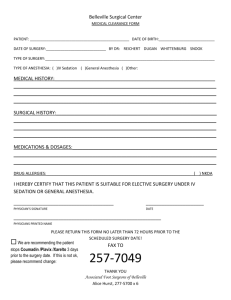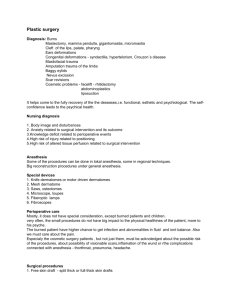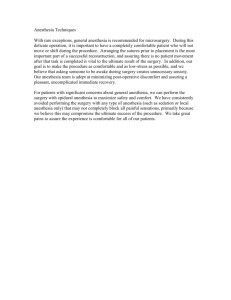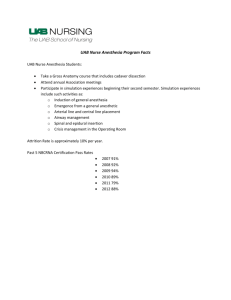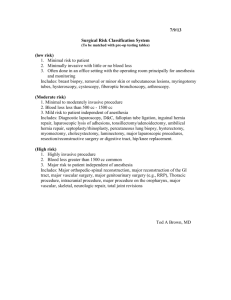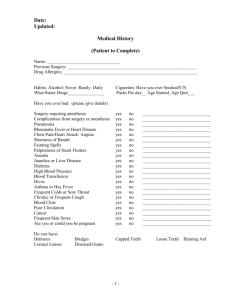Abrahamson - General Anesthesia
advertisement
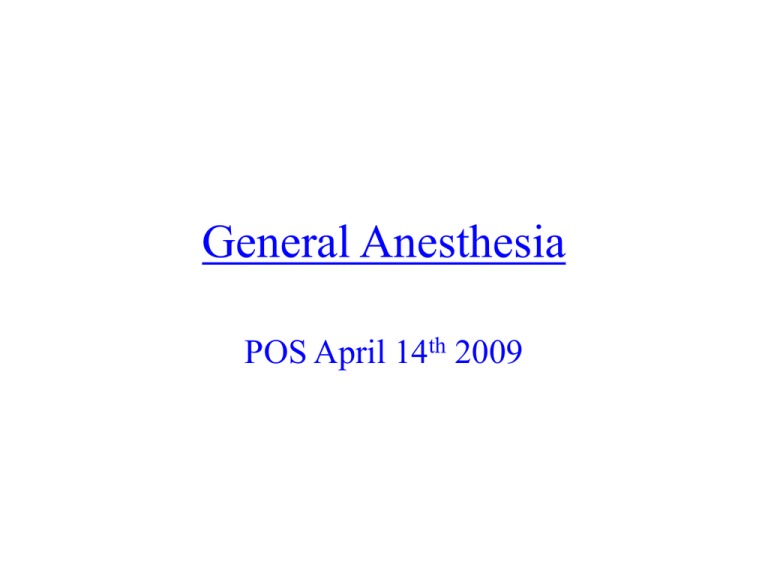
General Anesthesia POS April 14th 2009 Outline 1.Anesthesia Drugs / Monitors. 2. Anesthesia Events in the OR. 3. Anesthesia Consults. Am I missing something ? • Miller - 6th ed, 3204 pages (subtract about 800 pages for regional / pain) • Sabiston – 18th ed, 2353 pages. Am I missing something ? • Miller – 6th ed. , 3204 pages. • Sabiston – 18th ed. , 2353 pages. Takes five years to cover the material Am I missing something ? • Miller - 3204 pages. We can cover this in 60 to 90 minutes. • Sabiston – 18 ed . 2353 pages. And the POS exam is over ! • I’ll wake you up at the end. Biggest change for you since 2008? Biggest change for you since 2008? • Ask for 2 grams of Cefazolin preoperatively instead of 1 gram if the patient is > 80 kg. ANESTHETIC DRUGS / MONITORS Routine Monitors • • • • • • ECG. BP. Oximetry (use the ear probe in shock). End Tidal CO2 . Temperature (axillary vs. core). Future : Depth of anesthesia - BIS. (Bispectral index EEG) - scale from 0 to 100 March 2008 ,NEJM negative BIS trial. ETCO2 • Continuous monitor in OR. • Monitor of position of ETT (after 6 breaths). • Monitor acute decrease - ↓ Cardiac Output, Embolism. • Monitor acute rise - for M.H. Intravenous Drugs 1 .Propofol - less hangover, good anti emetic . Very easily contaminated. Pain on injection, 2 .Pentothal and Propofol - potent anticonvulsants and ICP. - BP - resp depressants 3. Ketamine - maintains BP, maintains respiration, but ICP. IM useage. Neuromuscular Blockers Succinylcholine • Can cause excess K+ release in certain conditions -ACUTE neuromuscular disease, burns > 20%. • IOP. • C / I in MH. • 5 minutes to recover from – metabolized by plasma cholinesterase . Cannot reverse its effect with other drugs Nitrous Oxide • MAC - 104%. • Enlarges air containing closed spaces e.g. obstructed bowel, middle ear, eye with SF6 , pneumothorax, VAE. • Negative outcomes large studies • High FIO2 and wound infection • Not often used - air /oxygen Vapours • All C / I in MH. • Lipid solubility important so awaken quickest from Desflurane. • Pungency - Sevoflurane least (epiglottitis). For inhalation induction /kids Toxicity vapours • • • • Halothane hepatitis (1:10 000) Isolated single reports with other vapors. Sevoflurane - possible nephrotoxic Fl- ion Nitrous Oxide - Possibly rate of spontaneous abortion (RR 1.3) and congenital abnormalities (RR 1.2). ?Recall bias,voluntary response. Neuromuscular BlockersNondepolarizing Drugs • • • • • • Cisatracurium, Pavulon, Rocuronium. Safe in M.H. but can cause anaphylaxis. Longer acting - 20 mins. to 90 mins. Monitor with nerve stimulator (train of four) But clinical testing e.g. head lift is best. Can reverse action with cholinergic drug e.g. neostigmine ANESTHETIC INTRAOPERATIVE EVENTS ASA Score 1 - Healthy. 2 - Mild systemic disease, no functional limitations. 3 - Severe systemic disease that limits activity. 4 - Incapacitating disease that is a constant threat to life. 5 - Moribund, not expected to survive 24 hrs, with or without surgery. E - Emergency ASA Difficult Airway Algorithm • Not possible to visualize any of the vocal cords = difficult. • Mallampati score - one of many aspects of airway assessment. • LMA – rescue device but does not protect vs. aspiration (Can be used as conduit for FFOB). Failed Intubation • Management depends on whether can ventilate or not. • Different blades and smaller tube. • LMA , Bronchoscope , Bougie, Glidescope • Cannot intubate , Cannot ventilate - need surgical airway. Aspiration • Risk factors - Morbid obesity, Pregnancy, Massive ascites, Diabetes, Pain esp. trauma. • Prophylaxis – H 2 blockers, Prokinetic agents, Sodium Citrate. • Rapid Sequence Induction (RSI). • Presents as desaturation or wheezing. • Guidelines : 6 hrs for light meal (clear fluid and toast) to 8 hrs. (meat) and 2 hours for clear fluids. Malignant Hyperthermia • • • • • • Triggered by vapours and Succinylcholine. Hypermetabolic state of muscles. ET CO2 , tachycardia (metabolic storm). Arrhythmias from K+ release – VT,VF Muscle rigidity and temp -LATE signs. Rx- Dantrolene (2,5mg/kg up to 10mg/kg), Airway fire 1. Ignition source — cautery, laser, flammable ointment alcohol based prep solution. 2. Fuel – drapes , PVC ETT. 3. Oxidizer near surgical site — Oxygen or Nitrous Oxide. • Laser surgery, Tracheotomy. • Disconnect patient from machine, extubate and extinguish with saline,ventilate or reintubate, evaluate airway damage (rigid bronchoscopy). Gas Embolism • Air, Helium, CO 2 . • Operative site above heart, low CVP. • Presents as ETCO2, SaO2, millwheel murmur, BP, PA pressures. • Rx - D/C Nitrous, Trendelenburg, flood field, aspirate from CVP catheter, left side down (airlock RV), consider hyperbaric oxygen. Latex Allergy • Multiple procedures, health care esp. dental workers, spina bifida, food sensitivity. • Prevent - glass syringes, remove top of vial, 1st case of day, premed optional. • Onset after 20 - 60 minutes. • Airway and 100% O2. • Volume. • Epinephrine - 0,1 micrograms / kg boluses Massive Transfusion • All complications of 1 unit -TRALI, Immunosuppression. • Hypothermia. • Hypocalcemia from citrate. • K + abnormalities (> 120 ml/ min). • Dilutional coagulopathy. ABO Transfusion Reaction • • • • • • Minimal signs under GA. Hypotension. Hemoglobinuria. DIC ( “oozy” NYD ). Blood for re XM and hemolysis workup. Die from DIC and ARF. Autologous donation • • • • • EPO and Iron supplementation. Clerical error (1: 100 000). Yersinia enterocolitica contamination. May not be enough blood. Anemia. Hypothermia • Core and peripheral component ,with tonic constriction normally. • 1st hour – rapid drop 1,5 °C – vasodilation. • 2nd stage - slow linear decrease for 2 -4 hours of 1,5 -2,5 ºC as heat loss exceeds metabolic heat gain . (radiation*,convection, evaporation, conduction) • 3rd stage - plateau after 2- 4 hours Adverse Effect Hypothermia • Cardiac - RCT 35.4°C vs. 36.7C in 300 patients undergoing abdo, vascular, thoracic (JAMA April 9 1127, 1997 ). • Postop morbid cardiac events: 1,4%vs 6,3% • VT : 2% vs. 8%. • Infection - RCT 200 patients undergoing colorectal surgery 34,7° vs. 36,6°- 3 x risk wound infection (NEJM 1996 334, 1209). Adverse effects hypothermia • Blood loss - 500 ml greater 35,5C vs. 36,6C in THA ( Lancet 1996 347 289) • Coagulopathy - platelet dysfunction and sequestration in liver, false negative normal PTT as lab always warms blood to 37. • 1 litre fluid or 1 unit blood temp 0,25C. • Forced air warming best method ($10) Positional Injuries • Ulnar - commonest (male, >4hrs, BMI<20 or >40). 27% used extra padding.Often delayed onset, at day 3. Occurs in regional anesthesia also. • Brachial plexus- median sternotomy, steep Trendelenburg with shoulder braces,prone esp. head to opposite side (females) Positioning • Arms < 90° when supine. • At side, neutral position. • On arm board – supinate. • Chest roll risk brachial neuropathy. DNR • Patient or SDM. – 3 choices for OR: 1.DNR intact. 2. DNR partially rescinded . 3. DNR rescinded completely • Discuss specifics and goals - chest compressions, pacing, defib, vasoactive drugs, postop ventilation, postop ICU ( time limited). Awareness • MAC. – 50% don’t respond in to pain in a “grossly purposeful” manner. Use surgical incision as stimulus. • Sandin – 18 / 11785 ( 0,15%). Trauma, OB, CV surgery. B – Aware trial . 2 vs. 11 cases using BIS (bispectral index) Laparoscopic Physiology • CVS - Trendelenburg or reverse - tachycardia from venous return,CO2 - bradycardia from insufflation • Resp - PCO 2 , atelectasis, subcutaneous emphysema, pneumothorax, CO2 embolus,venous stasis Laparoscopy • Hypothermia • Impaired renal flow • ICP PONV • Risk factors – female, nonsmoker, volatile agents, nitrous oxide, opioids, laparoscopy, middle ear, strabismus, breast surgery. • Prophylaxis – Serotonin antagonists e.g. Ondansetron. - Dexamethasone 4 - 8 mg IV. - Dimenhydrinate. Anesthesia Consults Risks of Anesthesia CEPOD - Mortality rate total contribution : 1. Patient factors 1: 870. 2. Surgical factors 1: 2860. 3. Anesthesia 1: 185,056 totally. Anesthesia partially 1: 1430. Fleisher - 564 267 outpatient , ASC , Office. Had a mortality of 25 -50 / 100 000. Newland - intraop arrest – 1/14 000.( 1/10 000) Myocardial ischemia • Risk of surgery - High ,intermediate and low. • > 4 Mets. • Beta blockade preoperatively- Atenolol, 200 patients - Noncardiac surgery. NEJM 1996 335, 1713. • Bisoprolol in vascular patients - NEJM 1999, 341, 1789. POISE Trial • Beta blockers decreased myocardial infarction , but increased stroke rate and overall mortality likely from decreasing blood pressure. • Risk / Benefit now much more uncertain AHA guidelines • Five risk factors (Lee or RCRI): - History CAD History heart failure History of CVA Renal insufficiency Diabetes Stents and elective surgery • Bare metal – minimum safe Plavix duration before discontinuation is 30 days. • Drug Eluting - only safe to stop Plavix after 365 days Respiratory Disease • • • • • • GA - FRC GA - Diaphragmatic function Shapiro score Po2 on room air <50, Pco2 45 Active wheezing Site of surgery especially upper abdomen and thorax Respiratory disease • Quit smoking > 8 weeks does resp complications (14.5% vs. 33% in 200 ACB) (Prospective, Mayo Clinic Proc 1989 ,64 609). • <48 hrs COHB levels and ciliary activity. • 1-2 Weeks to sputum. • PFT- only to diagnose,not prognosticate. AJRCCM Mar 1 2005. Respiratory disease • Laparoscopic approach- better ABG’s, PFT. • Epidural may be better- Meta analysis showed less atelectasis. • Lung expansion manoevres postop work Herbal remedies • CVS - Ginseng, Ephedra, St. Johns Wort, dietary hyperadrenergic • Bleeding - Ginko, Vit E, Ginger • Hepato and nephro toxic • Natural herb CPS • www.herbnet. com OSA • 3 Scoring factors: 1. Severity - AHI (6-20, 21-40, >40). 2. Invasiveness surgery. 3. Narcotic needs postoperatively. • CPAP use or not? • Ward, ward with 24 hr oximetry, Step-down Summary • Think ICU post-op especially for the emergency list patients (sepsis). • Consult for multiple Lee cardiac risk factors. • OSA – beware need for step-down bed. • Being available and in the OR at the beginning and end of the case is greatly appreciated and noticed. Sickle Disease • Hb AS -Trait - <40% S -only sickle at extremes of O2 and temp, not anemic • Hb SC - 50%S -eye, hip , pregnancy borderline anemia • Hb SS Disease > 80 %S, anemic • Get HBS < 40% • Keep warm and hydrated and oxygenated MaVs Trial • 496 patients for vascular surgery receive metoprolol or placebo 2 hrs preoperatively and for 5 days. • Blinded. • No difference in CV deaths or nonfatal MI • CJA 2004 51 . Ann Int Med Nov 2001

